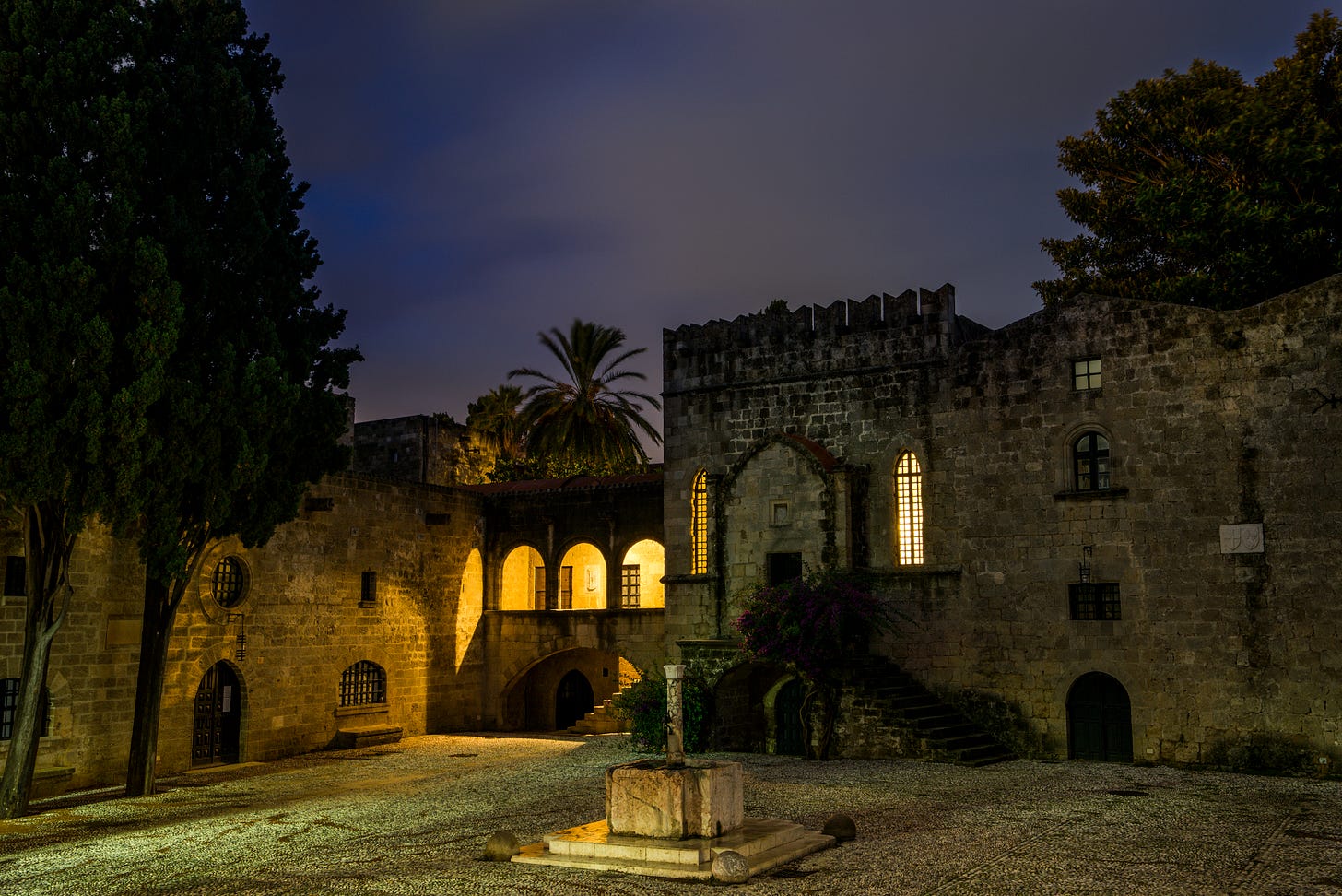Interestingly, after this past Sunday’s reading, which recounted Jesus’s cleansing of the Temple in Jerusalem,1 we come to a much calmer scene this coming Sunday: Jesus’s meeting with Nicodemus, a Pharisee and member of the Sanhedrin:
Jesus said to Nicodemus:
“Just as Moses lifted up the serpent in the desert, so must the Son of Man be lifted up, so that everyone who believes in him may have eternal life.
For God so loved the world that he gave his only Son, so that everyone who believes in him might not perish but might have eternal life. For God did not send his Son into the world to condemn the world, but that the world might be saved through him.
Whoever believes in him will not be condemned, but whoever does not believe has already been condemned, because he has not believed in the name of the only Son of God.
And this is the verdict, that the light came into the world, but people preferred darkness to light, because their works were evil. For everyone who does wicked things hates the light and does not come toward the light, so that his works might not be exposed.
But whoever lives the truth comes to the light, so that his works may be clearly seen as done in God.”
(John 3:14-21)
As is usual for John, there is a lot packed into these few verses. From an explanation of how the bronze serpent from Numbers 21:1-9 prefigures Jesus’s sacrifice on the Cross, to an explanation of God’s purpose in sending his only Son, to a warning about the consequences of failing to heed Jesus’s message. Too much, in other words, for a single weekly reflection. But what stands out for me in this week’s reading is what it says about Nicodemus and Jesus’s interesting choice of Apostles.
A Saint in the Sanhedrin
It is easy to read this week’s Gospel passage as a rebuke to Nicodemus and the Pharisees: “I’m right here and you don’t believe in me, so you won’t be saved,” Jesus seems to be saying. And indeed, we get plenty of confrontational encounters between Jesus and religious leaders in all the Gospels. That is especially true with John, who New Testament scholar Amy Jill-Levine points out, has a way of referring to Jesus’s opponents as “the Jews,” in a way that can seem hateful to modern ears.2
But if we look deeper, we see that Jesus’s message to Nicodemus is anything but a scolding. And the encounter is anything but confrontational.
Nicodemus, a Pharisee and a member of Sanhedrin, comes to Jesus with questions and the beginnings of faith in him as the Messiah. In this same passage, but before the reading, he says: “Rabbi, we know that you are a teacher come from God; for no one can do these signs that you do, unless God is with him.” (John 3:2.) In other words, at this point, Nicodemus has at least as good an understanding of Jesus as the Twelve, who persistently misunderstand Jesus’s purpose until after his Resurrection (and sometimes even after that).
Jesus then attempts to explain to this learned man (Jesus himself calls him “a teacher of Israel”) the meaning of Baptism and His own purpose on earth. But Nicodemus struggles to understand, as will the Apostles throughout scripture. To Jesus’s continued frustration.
But notice what Jesus says at the end of this week’s Gospel. He contrasts those who see the light and hide from it (those who, in other words, run from uncomfortable things) and those who see the light and “come to it.” Nicodemus may not understand the light, but he “comes to it” to try to understand it better. And he already is beginning to believe in Jesus, which Jesus has just said is enough to save him from condemnation. After all, Jesus says that whoever believes in Him will be saved, not that whoever understands His ways will be. Human beings, the Prophet Isaiah tells us, will never fully understand God’s ways: “For my thoughts are not your thoughts, neither are your ways my ways, says the Lord.” (Isaiah 55:10.) He asks instead merely for faith.
Of course, faith is easier than understanding only because understanding is impossible, not because faith is always or even often easy.
Jesus certainly challenges Nicodemus to look deeper and stretch himself to understand with some good-natured teasing: “If I have told you earthly things,” he says,” and you do not believe, how can you believe if I tell you heavenly things?” (John 3:12.) But the message as a whole is one of praise and encouragement. Unlike many others in Jesus’s time and afterward, Nicodemus is trying to understand, he has come towards the light instead of hiding from what makes him uncomfortable. And that is what Jesus wants.
We also know that Nicodemus listens, because he will later join Joseph of Arimathea, another Pharisee in the Sanhedrin, in helping to retrieve and bury Jesus’s body. (John 19:38-40.) The Church now recognizes both as Saints.
Apostles from the Margins
In fact, Nicodemus even hints in this passage that there are plenty more potential Jesus-followers in Jerusalem’s educated Jewish community. We know you come from God, he says, not I know you come from God. Which raises another question: If that is true, why were none of them among the Twelve?
We know for sure that both Nicodemus and Joseph of Arimathea were influential men in Israel at the time just by virtue of being in Sanhedrin. They were also educated. Surely they could help explain Jesus’s message? Connect it to the Old Testament? Record his words carefully? Defend him against his opponents?
And indeed, Jesus will eventually call Apostles with some of these skill sets. Matthew, as a tax collector, could almost certainly read and write—making him an obvious candidate as an Evangelist. And some scholars have suggested, as Pope Benedict XVI explained, that John’s father Zebedee may have been a priest in addition to a fisherman, making John another likely candidate for Gospel writing.3 Jesus will also later call Paul as an Apostle to the Gentiles, transforming him from a Temple-educated persecutor of early Christians into one of Christianity’s greatest evangelists and apologists.
Yet these Apostles are not influential members of the Sanhedrin. John, his brother James, and his father may be relatively well-off fishermen, but they are not “rulers” of the Jewish people. Matthew, as a tax collector, is essentially a pariah in the Jewish community. Paul, throughout his ministry, makes tents to support himself.4
The rest of the Twelve also make for a motley crew. Peter and Andrew are fishermen of no particular renown. The other Simon is a would-be revolutionary (a Zealot). And though we have no information on the others’ pre-discipleship professions, we also have no reason to suspect that any of them were powerful or prominent people.
So why is that?
Well, for one thing, as Pope Francis tells us: “The entire history of our redemption is marked by the presence of the poor” — indeed, salvation comes through the poor. Jesus himself takes the form of a poor craftsman. His birth is possible only through the “yes” of a poor virgin from Galilee. And so on.5 It follows that the same would be true in Jesus’s choice of Apostles.
For another, Jesus consistently points out that wealth, comfort, and power are often an impediment to understanding and living the Gospel. The most obvious examples of this are his advice to the Rich Young Man and his observation that it is easier for a camel to pass through the eye of a needle than for a rich man to enter heaven. But this message is present even in Nicodemus’s story. Contrast Nicodemus’s questions and obvious discomfort and doubts with Peter, Andrew, John, and James who “immediately” drop their nets when Jesus asks them to follow him. (Matthew 3:18-22.)
Learning can be an incredible aid to building faith and preaching the Gospel, but it can also make us resistant to ideas that challenge us or to unwelcome messages from unlikely messengers. The very type of messengers that, the Bible tells us over and over again, God is most likely to choose.
Finally, Jesus isn’t looking for learned testimony or influence. He is looking for faith, love, mercy, truth … things that are as accessible to the poor as to the rich, the wise as to the illiterate. Learning is great, but only if it is used for these greater goals.
And Jesus doesn’t need defenders who will help him influence the crowds and potentially avoid Crucifixion. The Crucifixion is why he came. He asks for disciples who believe in his mission and he wants disciples who love their neighbors enough to share his message of mercy.
Conclusion
So what to take from all this. For one thing, Nicodemus reminds us that we cannot lump any group of people together and judge them collectively. Scapegoating the Pharisees is not only unfair, it is unbiblical. But more than that, we must be willing to look past our own preconceptions to be on the lookout for God’s message for us in the most unlikely of places. From the mouths of a fisherman or the pen of a tax collector or, indeed, in the words of a poor itinerant carpenter from Nazareth—not only in the writings of priests or learned biblical scholars.
And when we think we do hear that message. And when it does make us uncomfortable or challenge our existing beliefs. We should move towards that discomfort as Nicodemus did. To test it, be open to it, live with it and in it, and ultimately learn from it. Even if we never understand it. That, ultimately, is what Jesus asks of all of us, fisherman and Pharisee alike.
Seven Loaves Are Enough is a Catholic lay apostolate that is entirely supported by reader contributors and offered for free to all. If you enjoyed this reflection, please consider sharing it with those close to you, leaving a comment to offer your own thoughts, or (if you can) contributing a small monthly donation to help maintain the site. Thank you so much for reading and may God bless you.
John, uniquely among the Gospel writers, places the cleansing of the Temple at the beginning of Jesus’s ministry (John 2:13-25). The Synoptic writers all place it at the end of His ministry, as one of the triggers for his arrest and execution. (See, e.g. Luke 19:45-48.) This has led to a debate over whether Jesus cleansed the Temple once or twice, and—if He only did it once—when that was. For the purposes of this post, though we’ll stick with John’s account. We are, after all, reading from John.
Amy-Jill Levine, The Misunderstood Jew 4 (2006).
Joseph Ratzinger (Pope Benedict XVI), Jesus of Nazareth 224-25 (2007).
NT Wright, Paul 11 (2018).
See Pope Francis, Evangelii Gaudium, in Pope Francis: The Complete Encyclicals, Bulls, and Apostolic Exhortations (Vol I) 146.




